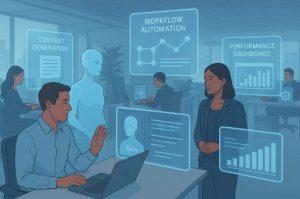In 2025, generative AI (GenAI) has evolved from a novel concept into a transformative force in business. Across industries, companies are leveraging AI not just for automation but to reshape strategy, drive innovation, and gain competitive advantage.
As GenAI becomes deeply embedded in enterprise operations, understanding its current state, trends, and implications is essential for staying ahead in a rapidly changing business environment.
What Is the GenAI Landscape in the Business World in 2025?

As we move through 2025, the business landscape has been fundamentally reshaped by the evolution of generative AI commonly referred to as GenAI. No longer an emerging technology, GenAI now sits at the heart of digital transformation strategies across nearly every sector.
An Era of AI-First Thinking
What distinguishes this era is a shift in mindset. Businesses are not merely digitising they’re becoming AI-first. This means leveraging generative AI not just for automation, but for core innovation. GenAI is being used to draft legal documents, compose marketing materials, design product prototypes, and even provide strategic recommendations based on real-time market data.
Massive Market Growth
The global artificial intelligence market is projected to reach over £300 billion in 2025, and the UK alone is one of the fastest-growing hubs for AI entrepreneurship. London’s own AI startup ecosystem is booming, thanks in part to government support and access to research institutions.
How Are Enterprises Adopting AI Technologies Across Industries?
Enterprise AI adoption has matured dramatically over the past 12 months. Once characterised by cautious pilot programmes and limited use cases, it has now reached full-scale integration in most large and mid-sized businesses.
The Transition from Experimentation to Integration
In previous years, companies viewed AI as an add-on something to trial. Today, it’s viewed as a necessity. From finance to healthcare, enterprise leaders are building AI into the very architecture of their business operations.
Many firms now have dedicated AI teams, budget allocations for AI development, and long-term strategies that incorporate machine learning and GenAI across departments. This shift has created a need for new skill sets and cross-functional collaboration between tech, compliance, and business units.
What Are the Top AI Business Trends to Watch in 2025?
The rapid progression of AI technologies has given rise to several trends that are actively shaping the way businesses operate in 2025.
Mainstream Generative AI Adoption
GenAI tools are no longer niche they’re in everyday use across marketing, customer service, legal, and design teams. From AI-generated content to AI-fuelled code assistants, these tools have become critical to operational efficiency.
Explainable AI Becomes Essential
With businesses making decisions based on AI-generated insights, there’s a growing demand for transparency. Explainable AI (XAI) helps organisations understand how AI systems reach conclusions a vital step toward trust and accountability, especially in regulated sectors.
Rise of AI Governance Frameworks
As AI becomes more embedded in core business functions, the need for ethical usage and compliance with new legislation has grown. In the UK, this includes adapting to post-Brexit AI standards while aligning with global best practices.
How Are Businesses Using GenAI Tools to Boost Productivity?

One of the most noticeable impacts of GenAI in 2025 is a sharp rise in productivity across every sector.
Transforming Repetitive Work
Administrative and repetitive tasks that once consumed hours can now be completed in minutes. GenAI systems draft emails, summarise reports, and generate financial projections with remarkable accuracy. This frees up employees to focus on creative and strategic initiatives.
Collaboration Between AI and Human Teams
Rather than replacing human workers, GenAI is acting as a collaborator. Teams are increasingly using AI to brainstorm ideas, explore new concepts, or assist with data-heavy tasks. The human-AI synergy is proving to be one of the most productive partnerships of the digital age.
Measurable Efficiency Gains
Many UK businesses have reported up to 30% time savings in customer service, marketing, and internal communications. This has allowed them to redirect human resources toward high-impact work and strategic innovation.
What Impact Is GenAI Having on Strategic Decision-Making?
AI is influencing more than just task-level productivity. it is fundamentally reshaping how decisions are made in boardrooms across the UK.
Data-Driven Leadership
Executives are no longer relying solely on intuition or historical data. Instead, they are using GenAI to run simulations, model future outcomes, and interpret complex datasets in real-time. This allows for more precise forecasting and risk mitigation.
Real-Time Strategy Adjustments
Market conditions change quickly, and GenAI enables businesses to respond with agility. Whether it’s adjusting a pricing strategy or re-aligning marketing messages based on live consumer sentiment, AI allows businesses to stay responsive and competitive.
How Are Companies Addressing Ethical Challenges in AI Implementation?
As GenAI systems gain influence over decision making and customer interactions, ethical concerns have become a priority for UK businesses.
Addressing Bias in AI Outputs
Even the most sophisticated models can unintentionally reproduce bias. Businesses are investing in model audits and fairness metrics to ensure equitable outcomes, particularly in sectors like finance, law, and recruitment.
Regulatory Compliance and Governance
In the UK, the regulatory framework around AI is becoming more defined. Businesses must now ensure they are transparent about how data is collected, how AI models are trained, and how decisions are made. Governance frameworks are being adopted across industries to maintain ethical standards and build consumer trust.
Building Responsible AI Teams
More companies are hiring Chief AI Ethics Officers and assembling internal AI governance committees. These roles are tasked with ensuring that AI deployments align with company values, customer expectations, and evolving legislation.
Which Industries Are Seeing the Biggest Shifts Due to AI?

AI’s influence is felt across the board, but some sectors are experiencing particularly profound transformations.
Financial Services
From real-time fraud detection to personalised wealth management, AI is transforming how financial institutions operate. In London’s financial district, many firms have adopted AI-driven systems for compliance checks and automated reporting.
Healthcare
Hospitals and medical research centres are using AI to accelerate drug discovery, analyse patient scans, and optimise hospital logistics. GenAI also supports administrative tasks, allowing doctors to spend more time with patients.
Legal and Professional Services
Law firms are using GenAI for document review, case law research, and client communication. This is not just saving time but also reducing costs and improving service quality.
What Does the Future Hold for AI in Business Beyond 2025?
The next phase of AI in business will be marked by even deeper integration, greater customisation, and wider accessibility.
The Rise of AI-Native Organisations
We’re beginning to see the emergence of companies built entirely around AI capabilities. These AI-native organisations are lean, agile, and capable of scaling with minimal human input often outperforming traditional digital businesses.
Hyper-Automation at Scale
Businesses will move beyond simple automation to “hyper-automation” integrating AI, machine learning, robotics, and data analytics to create fully autonomous systems for supply chains, finance, and customer engagement.
Human-AI Collaboration as Standard Practice
AI will continue to serve as a strategic co-pilot, not a replacement for human intellect. The focus will be on enhancing human decision-making, not eliminating it. Future business leaders will be those who best understand how to work with AI.
How Can London-Based Businesses Leverage AI for Competitive Advantage?
London is a unique environment for AI-driven businesses thanks to its combination of talent, investment, and innovation.
Access to Skilled Talent
With top universities such as Imperial College London and UCL producing AI researchers and engineers, the city remains a magnet for AI expertise. This gives London-based firms an edge in building in-house AI capabilities.
Thriving Startup Ecosystem
From Shoreditch to Canary Wharf, London’s startup scene is rich with GenAI innovation. Partnering with or investing in local startups offers established businesses fast access to cutting-edge technology.
Government Support and Incentives
The UK government continues to support AI development through tax credits, innovation grants, and programmes like Innovate UK. London businesses can take advantage of these to fund AI projects and trials.
Conclusion
By all measures, 2025 represents a tipping point in the business use of GenAI. It’s the year when generative AI moved from pilot programmes and innovation labs into the core of business operations.
Organisations that embraced GenAI early are already seeing competitive advantages faster product development, smarter decisions, and more engaged customers. The coming years will be defined not by whether a business uses AI, but by how well it integrates, governs, and evolves with it.
Those who treat GenAI as a foundational element not just a tech trend will be best placed to lead in the AI-driven future.
FAQs About the GenAI State of AI in Business 2025
What defines a GenAI-first business model?
A GenAI-first model uses generative AI across core functions strategy, marketing, development placing AI at the centre of innovation and operations.
Is GenAI suitable for SMEs, or only large enterprises?
GenAI tools are increasingly accessible and cost-effective, making them a powerful asset even for small and medium-sized enterprises.
How can businesses ensure their AI use is ethical?
Establishing AI governance teams, applying fairness checks, and complying with local regulations ensures responsible AI deployment.
Are there risks to relying heavily on GenAI for business decisions?
Yes, including overreliance, bias, or lack of human oversight. Businesses must treat AI as a collaborator not a final authority.
What skills are essential to working alongside GenAI in 2025?
Skills like prompt engineering, data literacy, strategic thinking, and ethical awareness are key for human-AI collaboration.
How do London companies stand out in AI innovation?
London offers a unique blend of top talent, access to capital, strong regulatory frameworks, and a vibrant tech ecosystem that fosters rapid AI adoption.
What’s next for GenAI beyond 2025?
Future developments include more personalised AI tools, deeper integration with physical systems (like robotics), and greater decentralisation of AI services.









Leave feedback about this